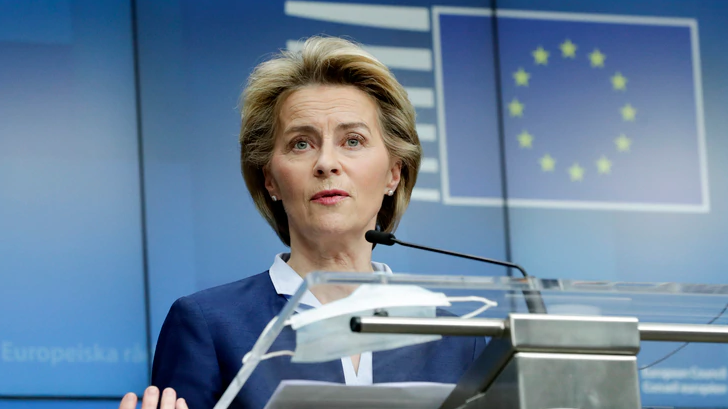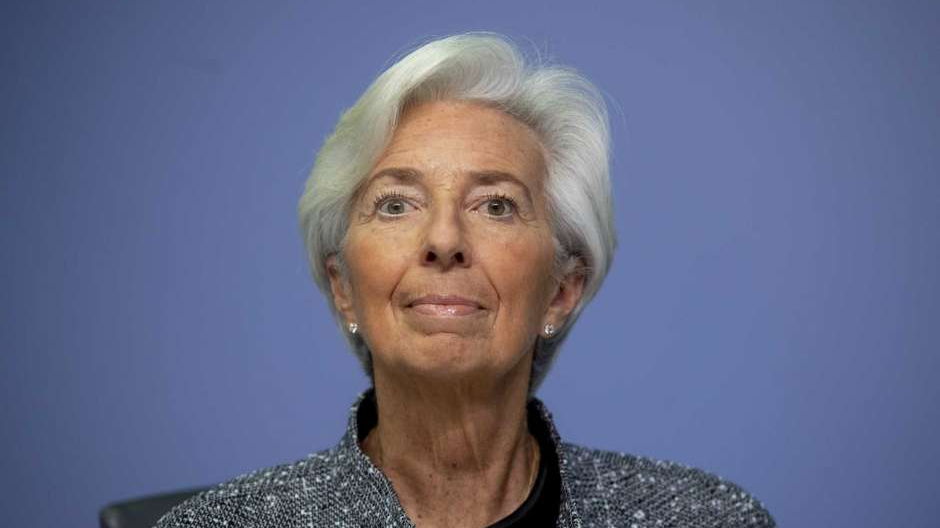
European Commission President Ursula von der Leyen addresses a media conference after an EU summit, in video conference format, at the European Council in Brussels, June 19, 2020. /AP
European Commission President Ursula von der Leyen addresses a media conference after an EU summit, in video conference format, at the European Council in Brussels, June 19, 2020. /AP
Editor's note: Djoomart Otorbaev is the former Prime Minister of the Kyrgyz Republic, a distinguished professor of the Belt and Road School of Beijing Normal University, and a member of Nizami Ganjavi International Center. The article reflects the author's views, and not necessarily those of CGTN.
Due to a complete lack of trust, a new "cold war" between China and the U.S. became almost inevitable. I already wrote that in an article that it would become a potential disaster for the whole world. It can be even bigger distress for the world than the current pandemic.
In that article, I argued that only the EU can mitigate the threat. In the context of a potentially long-term global fight between the U.S. and China, the role of the EU would be exceptionally important. But it can happen only when the EU will be strong and united.
In this article, I would like to discuss the current development of events with a focus on how the EU could get stronger.
On June 22, the top leadership from China and the EU talked via video link and discussed a range of issues relating to bilateral trade and investment, climate change, research and development on COVID-19 vaccine, peace and security, global supply chains, and human rights.
Both sides reached a consensus on all-inclusive cooperation which was also a clear denial of unilateralism and protectionism, being practiced by the United States.
The EU and China are huge trading partners, accounting for more than a third of the global GDP. China says it will continue to open up its economy to foreign businesses, which is a key demand from the EU, and see common cause with Brussels in stand up for markets and multinational rules in the face of U.S. protectionism.
Positive developments, rather than controversial and conflicting events, are taking place in Europe now.
What is going on with the European economy? Do the Europeans need money and investments? How are they going to save the current jobs and create new ones? Or are they in comfort with the status quo?
Over the past decade, the average economic growth in the EU has already been in decline - on average about 1.5 percent per year according to Eurostat. Pandemic put the Euro economy on its knees. The European Central Bank (ECB) is forecasting an enormous quarter-on-quarter fall of 13 percent in the second quarter and a contraction of 8.7 percent in 2020.
On June 19, European Central Bank President Christine Lagarde and German Chancellor Angela Merkel warned the EU leaders' summit by video conference that if they fail to agree on a huge stimulus package of at least 750 billion euros (844 billion U.S. dollars), the consequences for the Euro economy could be catastrophic.

President of European Central Bank Christine Lagarde at a press conference following a meeting of the ECB governing council in Frankfurt, Germany, March 12, 2020. /AP
President of European Central Bank Christine Lagarde at a press conference following a meeting of the ECB governing council in Frankfurt, Germany, March 12, 2020. /AP
Mrs. Merkel has been straightforward, "It's no exaggeration to say we are facing the biggest economic challenge in the history of the European Union." Ms. Lagarde said that the worst impact on labor markets is still to come and unemployment could end up as high as 10 percent.
This means that Europe urgently needs money and investments.
However, on a note on June 17, (two days before the emergency summit) the European Commission (EC) has adopted a special white paper dealing with the "distortive effects caused by foreign subsidies in the single market." Many experts agreed what this obscure statement means - EC fears that Chinese investors will exploit the pandemic to snap up financially distressed European companies for cheap.
Aside from a few isolated cases like the acquisition of a small stake in Norwegian Air (and Norway is not an EU country), which was on the brink of bankruptcy, there isn't much evidence that Chinese companies are now on a buying spree in Europe.
Quite on the contrary, Chinese investment in Europe has been steeply declining. Chinese investors spent only about 12 billion euros (13.5 billion U.S. dollars) in Europe last year, only a third of what they spent in 2016, according to research by Rhodium Group.
The share of investments from China's state-owned enterprises (SOE's) was around 11 percent. According to Xinhua Factbox, investments by Chinese companies last year created nearly 260,000 jobs in the EU.
How dangerous are Chinese foreign direct investments (FDI) for EU security and stability? According to Rhodium Group, the share of Chinese FDI in Europe stays at 2.2 percent, in comparison with FDI from the U.S., which is 38 percent. Similarly, the EU countries held only four percent of the total FDI in China in 2016, versus their 36 percent FDI's in the States. Why then to worry about the "Chinese invasion"?
All countries around the world are fighting for the investments. If Europe doesn't want to strengthen its economy and to create jobs, the others will be more apolitical.
A great time of expectation, controversy, and uncertainty awaits us. During the pandemic, the global supply chains which looked eternal and indestructible began to be disturbed as a result of the introduction of the principles of "economic nationalism."
In my recent article on the post-pandemic world, I underlined that "closer attention to sovereign globalization," aimed at cultural characteristics and localized solutions will continue after the end of the epidemic. Thus the risk of long global economic decline is higher than ever.
The longer we are in self-isolation, the deeper the economic wounds, the slower will be the recovery process. In the post-virus world, the investments are likely to fall, jobs will be lost, labor productivity will decrease. Fixing of these numerous problems will require decisive action by the world's political and economic elites, including the European ones.
(If you want to contribute and have specific expertise, please contact us at opinions@cgtn.com.)